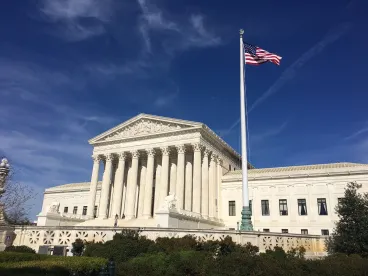Greetings, Court fans!
With the imminent inauguration of a new President and the mob attack on Congress dominating the news in recent weeks, the third branch continued humming along in the background. Late last week, the Court issued its sixth signed opinion of the term, in a low-profile bankruptcy case. The Court also added 14(!) new cases to its docket, but it has left several high-profile cert petitions dangling for two consecutive weeks. On Friday, however, the Justices did step briefly into the limelight, with another decision—over sharply worded dissents—permitting the outgoing Trump administration to go forward with a (once rare) federal execution.
Let’s begin with the decision in City of Chicago v. Fulton (No. 19-357), where a unanimous Court held that the Bankruptcy Code’s automatic stay does not require entities in possession of certain items of the bankrupt estate’s property to turn it over on demand.
One of the more important provisions of the Bankruptcy Code is the so-called automatic stay of 11 U.S.C. § 362(a). It says that a debtor’s filing of a bankruptcy petition “operates as a stay, applicable to all entities” of efforts to collect from the debtor outside the bankruptcy process (with some exceptions). This helps preserve the debtor’s estate and prevents individual creditors from making a rush toward individual assets (to the detriment of other creditors). To make sure this provision has some teeth, it allows for the recovery of damages, attorneys’ fees, and even potentially punitive damages from individuals or entities who willfully violate the automatic stay. And while the automatic stay perhaps most often operates to halt pending litigation against the debtor, it doesn’t just apply to legal proceedings. Among other things, it prohibits creditors from taking “any act to obtain possession of” the estate’s property of from “exercising control over property of the estate.”
These last provisions were at issue in Fulton. There, the City of Chicago impounded Fulton’s car for motor vehicle infractions. Fulton declared bankruptcy and asked the City to return his vehicle. The City refused. The bankruptcy court and then the Seventh Circuit held this refusal violated the automatic stay, because by retaining possession of the car, the City was “exercising control over” Fulton’s property. Because other courts had reached different results, the Court granted certiorari.
In seven short pages, Justice Alito, writing for a unanimous Court, reversed. (Justice Barrett did not participate because the case was argued before she was confirmed.) Starting with the plain text, Section 362(a) is most naturally read as prohibiting affirmative acts that would disturb the status quo as of when the bankruptcy petition was filed. After all, it speaks of “acting to obtain” or “exercising control over” property, words that suggest something more active than simply retaining what you already have.
Any ambiguity was resolved by a separate provision, Section 542(a) of the bankruptcy code. It requires those in possession of the debtor’s property to deliver it to the trustee (with certain exceptions and complications, of course). But if Section 362(a)’s automatic stay required those in possession of the debtor’s property to turn it over immediately, then Section 542(a) wouldn’t serve much of a purpose. Worse, Section 542(a) would in some cases conflictwith Section 362(a), because there are some situations where Section 542(a) doesn’t require property to be turned over, but Section 362(a) would nonetheless subject one who fails to do so to liability.
Finally, Justice Alito turned to the history of the bankruptcy code. Section 362(a)’s “exercise control over property” language wasn’t added to the statute until 1984. And then, it received almost no discussion and came with no cross-reference to Section 452(a). If Congress intended this addition to Section 362(a) to be a drastic change in the law—requiring any entity in possession of a debtor’s property to immediately turn it over on pain of damages for violating the automatic stay—one would’ve expected Congress to say as much. For all these reasons, Justice Alito concluded that Section 362(a) is not violated by the mere retention of property belonging to the bankrupt estate.
Justice Sotomayor separately concurred. She agreed that Section 362(a)’s automatic stay does not require creditors to turn over the debtor’s property on the filing of a bankruptcy petition. But she noted that the City’s actions might violate other provisions of the automatic stay or the bankruptcy code more generally. She explained why this was important by filing in some of the facts of the cases below. Briefly, the debtors at issue in the case were low-income people who were unable to pay small tickets for parking or other minor vehicle violations. Late fees and penalties meant these unpaid tickets soon mushroomed into big debts owed to the City. When the debt became large enough, the City increasingly resorted to impounding the cars, resulting in more penalties and fees. Worse, it deprived the debtors of their most important asset, in many cases preventing them from commuting to work (and hence earning a living). With little other choice, they declared bankruptcy, hoping to get their cars back while the bankruptcy petition was pending, but the City still refused to return their cars until their debt to the City was repaid or their bankruptcy petition was resolved, something that can take quite a while (even for those with few assets). While lower courts had developed certain mechanisms to try to expedite proceedings and address these problems, Justice Sotomayor concluded by urging lawmakers and policymakers to come up with a more comprehensive solution to situations like these.
While Fulton is the only decision in an argued case in recent weeks, there have been a number of consequential decisions in death-penalty cases since our last Update. Late Friday evening, the Court vacated a final stay of execution in the case of Dustin Higgs, one of 13 inmates the Government has killed since resuming federal executions six months ago. Several of these cases have prompted sharp dissents from some of the more liberal justices, who have suggested that the Court has participated in an unseemly rush to execute as many death-row inmates as possible before a new Administration halts executions. In Higgs’s case, for example, the Court took the unusual step of granting a petition for certiorari before judgment, vacating the district court’s stay of execution before the circuit court had even heard argument.
Dissenting in Higgs’s case, Justice Sotomayor named all twelve inmates who were executed before him, noting that “the Federal Government [has] executed more than three times as many people in the last six months than it ha[s] in the previous six decades.” In Justice Sotomayor’s view (echoed in a separate dissent by Justice Breyer), the emergency appeals the Court has heard over the last six months raise important, and unanswered questions, about the Federal Death Penalty Act. But a majority of the Court “has consistently rejected inmates’ credible claims for relief,” going so far as to “lift stays of execution that lower courts put in place, thereby ensuring those prisoners’ challenges would never receive a meaningful airing.” To Justice Sotomayor, “[t]his is not justice. After waiting almost two decades to resume federal executions, the Government should have proceeded with some measure of restraint to ensure it did so lawfully. When it did not, this Court should have. It has not.”
Less controversially, the Court added 14 new cases to its docket (all in one orders list), though it has thus far refrained from acting on several hot-button petitions involving abortion, election challenges, and the emoluments clause. The new cases are:
Americans for Prosperity Foundation v. Becerra and Thomas More Law Center (No. 19-251) v. Becerra (19-255), consolidated cases challenging a California rule requiring charities to disclose the names and addresses of their major donors under the First Amendment;
Mahanoy Area School District v. B.L. (No. 20-255), asking whether the rule of Tinker v. Des Moines, which permits public school officials to regulate speech that would materially and substantially disrupt school work and discipline, applies to student speech that occurs off-campus;
Terry v. United States (No. 20-5904), asking whether defendants who were sentenced for low-level crack-cocaine offenses before enactment of the Fair Sentencing Act of 2010 are eligible for resentencing under the First Step Act of 2018;
Greer v. United States (No. 19-8709), asking whether a circuit court can review matters outside the trial record when determining whether an alleged error affected a defendant’s substantial rights or affected the trial’s fairness, integrity, or public reputation, as necessary to satisfy “plain error” review;
Sanchez v. Wolf (No. 20-315), asking whether, under 8 U.S.C. 1254a(f)(4), a grant of temporary protected status authorizes eligible noncitizens to obtain lawful-permanent-resident status;
San Antonio v. Hotels.com (No. 20-334), asking whether district courts have discretion to deny or reduce appellate costs deemed “taxable” in district court under Federal Rule of Appellate Procedure 39(e);
Guam v. United States (No. 20-382), asking whether a settlement that is not reached under the Comprehensive Environmental Response, Compensation, and Liability Act (CERCLA) and that expressly disclaims a liability determination can trigger a contribution claim under CERCLA Section 113(f)(3)(B);
United States v. Palomar-Santiago (No. 20-437), asking whether a defendant charged with unlawful reentry following removal from the United States can automatically satisfy the prerequisites to asserting invalidity of the original removal order by showing that he was removed for a crime that would not be considered a removable offense under current law;
Minerva Surgical Inc. v. Hologic Inc. (No. 20-440), asking whether a defendant in a patent infringement action who assigned the patent, or is in privity with an assignor of the patent, may have a defense of invalidity heard on the merits;
United States v. Gary (No. 20-444), asking whether a defendant who pleaded guilty to possessing a firearm as a felon is automatically entitled to plain-error relief if the district court did not advise him that one element of the offense is knowledge of his status as a felon;
HollyFrontier Cheyenne Refining v. Renewable Fuels Association (No. 20-472), asking whether, in order to qualify for a hardship exemption under the Renewable Fuel Standards, a small refinery needs to receive uninterrupted, continuous hardship exemptions for every year since 2011; and
Mnuchin v. Confederated Tribes of the Chehalis Reservation (No. 20-543) and Alaska Native Village Corporation association v. Confederate Tribes of the Chehalis Reservation (No. 20-544), consolidated cases asking whether Alaska Native regional and village corporations are “Indian tribes” under the Indian Self-Determination and Education Assistance Act and therefore eligible for emergency-relief funds under the CARES Act.
That list will keep the Court fairly busy for the rest of the term, though there are still a number of interesting petitions in the hopper. We’ll be tracking those and keeping you apprised of new decisions as they’re handed down.





 />i
/>i

